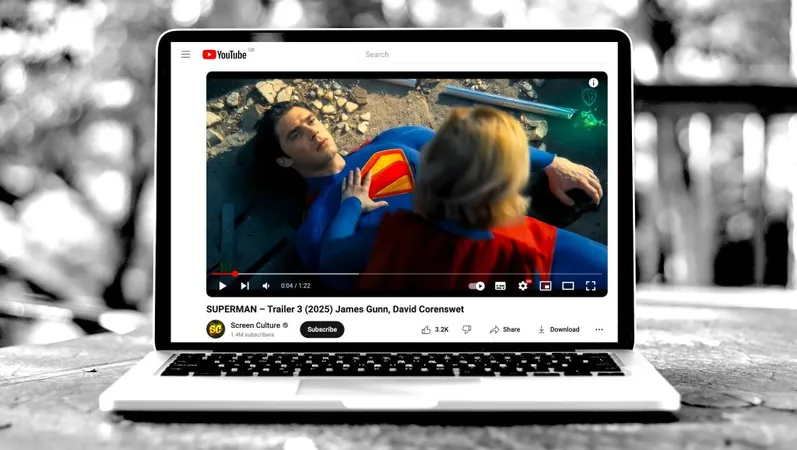
YouTube Cracks Down on 'Fake' Movie Trailer Channels After Investigation Reveals Exploitation of AI Technology
2025-03-30
Author: Liam
YouTube's Policy Shift
In a significant policy shift, YouTube has terminated the ad monetization privileges of two prominent channels known for producing fabricated movie trailers, following an in-depth investigation by Deadline. The channels Screen Culture and KH Studio had garnered considerable attention and revenue by leveraging artificial intelligence to create trailers that mimic official content from popular franchises.
Investigation Findings
The investigation unveiled that Screen Culture was crafting trailers that closely resembled marketing materials for major films like The Fantastic Four: First Steps and Superman. By integrating AI-generated visuals, these trailers promised tantalizing glimpses that hooked dedicated fanbases. Similarly, KH Studio produced humorous yet outrageous takes on beloved franchises, imagining scenarios where Henry Cavill and Margot Robbie starred in a James Bond film or featuring Leonardo DiCaprio in a hypothetical season of Squid Game.
Hollywood's Relationship with YouTube
Interestingly, the investigation highlighted a potentially murky relationship between certain Hollywood studios like Warner Bros. Discovery and Sony and YouTube. Instead of enforcing copyright, these studios were reportedly requesting that YouTube direct ad revenue from these AI-enhanced videos to them. Both Warner Bros. and Sony chose not to comment on the situation.
YouTube's Response and Policy Enforcement
YouTube's response was decisive; they removed Screen Culture and KH Studio from the YouTube Partner Program, which prohibits them from earning revenue from their videos due to violations of monetization policies. Creators are reminded that they must significantly transform borrowed material to claim it as their own, and any content that is misleading falls under strict misinformation guidelines.
Reactions and Future Implications
While both channels have the option to appeal YouTube’s stringent decision, there’s a broader conversation about the implications of such AI-generated content. Screen Culture’s founder, Nikhil P. Chaudhari, expressed his disappointment, arguing that his intention had always been to entertain and explore creative avenues. He mentioned that he's managed to build a substantial following, doubling their views and now possessing 1.4 billion views and 1.4 million subscribers over the last two years, translating into significant revenue, although the specifics remain undisclosed.
Viewers' Perspective
In reaction to the changes, viewers are left questioning the lines between creativity and deception in digital content. With viewers often aware that Screen Culture does not host official trailers, Chaudhari attempted to downplay criticism by asking, “What’s the harm?” Given the rapid evolution of AI and digital content creation, only time will tell how platforms like YouTube will adapt to a landscape filled with both innovation and potential misinformation.
Looking Ahead
As YouTube continues to refine its policies, creators and fans alike will be watching closely. Will these changes deter similar channels or inspire new ways of content creation? The future of digital media may hinge on the balance between originality and imitation.









 Brasil (PT)
Brasil (PT)
 Canada (EN)
Canada (EN)
 Chile (ES)
Chile (ES)
 Česko (CS)
Česko (CS)
 대한민국 (KO)
대한민국 (KO)
 España (ES)
España (ES)
 France (FR)
France (FR)
 Hong Kong (EN)
Hong Kong (EN)
 Italia (IT)
Italia (IT)
 日本 (JA)
日本 (JA)
 Magyarország (HU)
Magyarország (HU)
 Norge (NO)
Norge (NO)
 Polska (PL)
Polska (PL)
 Schweiz (DE)
Schweiz (DE)
 Singapore (EN)
Singapore (EN)
 Sverige (SV)
Sverige (SV)
 Suomi (FI)
Suomi (FI)
 Türkiye (TR)
Türkiye (TR)
 الإمارات العربية المتحدة (AR)
الإمارات العربية المتحدة (AR)